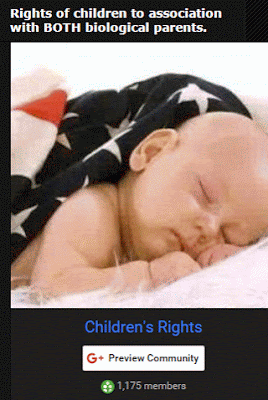THE FLORIDA BAR JOURNAL, VOL. 73, No. 3, MARCH 1999, p 44-48
Parental Alienation Syndrome:How to Detect It and What to Do About It
by J. Michael Bone and Michael R. Walsh
Although parental alienation syndrome (PAS) is a familiar term, there is still a great deal of confusion and unclarity about its nature, dimensions, and, therefore, its detection.(1)
Its presence, however, is unmistakable. In a longitudinal study of 700 "high conflict" divorce cases followed over 12 years, it was concluded that elements of PAS are present in the vast majority of the samples.(2) Diagnosis of PAS is reserved for mental health professionals who come to the court in the form of expert witnesses. Diagnostic hallmarks usually are couched in clinical terms that remain vague and open to interpretation and, therefore. susceptible to argument pro and con by opposing experts.
The phenomenon of one parent turning the child against the other parent is not a complicated concept, but historically it has been difficult to identify clearly. Consequently, cases involving PAS are heavily litigated, filled with accusations and counter accusations, and thus leave the court with an endless search for details that eventually evaporate into nothing other than rank hearsay.
It is our experience that the PAS phenomenon leaves a trail that can be identified more effectively by removing the accusation hysteria, and looking ahead in another positive direction.
For the purpose of this article the authors are assuming a fair degree of familiarity with parental alienation syndrome on the part of the reader.(3) There are many good writings on PAS which the reader may wish to consult now or in the future for general information. Our focus here is much more narrow. Specifically, the goal is twofold. First we will describe four very specific criteria that can be used to identify potential PAS. In most instances, these criteria can be identified through the facts of the case, but also can be revealed by deposition or court testimony. Secondly, we wish to introduce the concept of "attempted" PAS; that is when the criteria of PAS are present, but the child is not successfully alienated from the absent parent. This phenomenon is still quite harmful and the fact of children not being alienated should not be viewed as neutral by the court.
--------------------------------------------------------------------------------Any attempt at alienating the children from the other parent should be seen as a direct and willful violation of one of the prime duties of parenthood.
--------------------------------------------------------------------------------The criteria described below are fairly easy to identify separate and apart from the court file. When there is uncertainty about any of them, these criteria can be used to guide the attorney in the deposing of witnesses as well as in their examination in court.
Criteria I: Access and Contact Blocking
Criteria I involves the active blocking of access or contact between the child and the absent parent. The rationale used to justify it may well take many different forms. One of the most common is that of protection. It may be argued that the absent parent's parental judgment is inferior and, therefore, the child is much worse off from the visit. In extreme cases, this will take the form of allegations of child abuse, quite often sexual abuse. This will be addressed in more detail in Criteria II, but suffice it to say that often this is heard as a reason for visitation to be suspended or even terminated. On a more subtle and common level, an argument heard for the blocking of visitation is that seeing the absent parent is "unsettling" to the child, and that they need time "to adjust." The message here is that the absent parent is treated less like a key family member and more like an annoying acquaintance that the child must see at times. Over time, this pattern can have a seriously erosive effect

WHY IS THIS A CRITICAL ISSUE?

Denial of reasonable access to your own kids is child abuse
Posted by Parental Alienation & other Child abuse awareness/prevention on Sunday, October 25, 2015











































